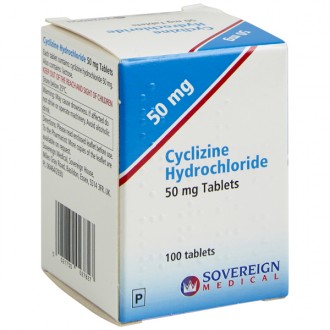Nausea is characterised by a stomach discomfort that makes you feel like you might vomit. Many people experience it occasionally, and it often goes away naturally. However, if you have an underlying condition or suffer from recurrent bouts of nausea, you might seek treatment.
Pharmacy Online has effective nausea treatments that relieve nausea and its associated symptoms. We understand you don't want to head to your local pharmacy when feeling sick, but our convenient online service sends nausea medicines straight to your door.
With a free online consultation and expert support from a fully registered pharmacist, we'll help you navigate your nausea and not let it hold you back.
What is nausea?
Many people get a feeling of nausea before vomiting occurs, but it's not uncommon to experience nausea without being sick. The sensation of discomfort often makes people feel they might vomit, with feeling flushed and sweating being common symptoms.
You might feel dizzy and retch without needing to vomit, making the entire experience uncomfortable. Some people also find that movement and eating make nausea worse.
The causes of nausea
There are multiple potential causes of nausea, and understanding yours can help you treat the problem. In some cases, nausea might be a stand-alone condition, but it's typical to experience it when you're suffering from something else.
Medications, gastrointestinal conditions and a general sensitivity to light and motion can contribute to frequent nausea.
Taking medicines
Certain medicines are known to cause nausea, including:
- Opioids
- NSAIDs
- Antidepressants
- Antibiotics
- Herbal supplements and vitamins
Individuals undergoing chemotherapy can also experience frequent nausea. According to research from Science Direct, chemotherapy-induced nausea occurs in 40% of patients, with some also dealing with vomiting.
Viral infections
If you have food poisoning or another form of viral infection, it could result in nausea. The flu virus is another common culprit of nausea, which is why it's essential for eligible people to receive their annual vaccinations.
Gastroenteritis is a common infection that can cause stomach aches, diarrhoea and vomiting. However, some people might experience ongoing nausea.
GERD and heartburn
Minor forms of acid reflux - also known as heartburn - can cause a burning sensation in the chest, typically after a sufferer eats or lies down. However, severe acid reflux can turn into GERD.
Gastroesophageal reflux disease is a condition that causes food to go into the oesophagus after eating, causing burning sensations and sometimes vomiting. Unfortunately, it can occur when eating both hot and cold foods, with nausea being a common symptom.
Nausea symptoms are common with acid reflux, and many people have to treat the condition with medications, along with changing their diet.
Lifestyle choices
Your lifestyle can also contribute to nausea, especially if you follow an unhealthy diet. Consuming high amounts of fatty, spicy foods can cause discomfort, along with eating foods you're sensitive to.
Alcohol can also contribute to gastrointestinal conditions, with frequent drinkers more at risk of nausea (Drink Aware). The best way to prevent nausea is by consuming healthy foods and limiting your alcohol intake.
Sea and motion sickness
Some people experience nausea when travelling due to how the brain processes the movement. Waves from the sea can cause you to feel dizzy, resulting in nausea and vomiting, while it's common to experience general nausea while travelling in a car or other vehicle.
Chronic conditions
Numerous chronic conditions can cause nausea, including:
- Vertigo
- Migraines
- Kidney or liver disorders
- Peptic ulcers
- Diabetes
- Brain tumours
For example, peptic ulcers form due to acid and eating certain foods can irritate them, causing nausea and indigestion. Many individuals who suffer from migraines feel sick and dizzy during an attack, with bouts of nausea being one of the main symptoms.
Pregnancy
Many pregnant women experience nausea - also known as morning sickness. However, despite common belief, morning sickness can appear throughout the day, making it hard to work or perform daily activities.
Hormonal and gastrointestinal changes are the common culprits for nausea, but stress and increased salivation can also play a role in pregnant women feeling like they need to vomit.
Diagnosing nausea
In most nausea cases, the individual can attribute their symptoms to a particular condition or external factor, but if nausea appears suddenly, it's essential to seek medical help. Rarely, severe nausea might be due to a heart attack or a severe bacterial infection, including meningitis.
If OTC treatments seem to worsen nausea, or you cannot eat and drink for 12 hours, seek medical attention immediately. Your doctor will be able to rule out other conditions and control the symptoms.
How to treat nausea
To treat nausea successfully, it's important to understand the cause. For example, some treatments to control nausea caused by motion sickness might not help people undergoing chemotherapy. In some cases, taking steps to prevent nausea is more effective than a cure.
Anti-nausea medications
Medications for nausea can treat motion sickness and associated contributors. They work by limiting your brain signals, which can stop nausea and severe abdominal pain from occurring.
Popular medicines in this category include Cyclizine and Prochlorperazine, suitable for general nausea. However, you should contact our pharmacists if you're pregnant, have a chronic condition or are taking prescription and nonprescription drugs.
Treating the underlying cause
One of the best ways to treat chronic nausea is by addressing the underlying condition. For example, individuals with acid reflux can take over-the-counter tablets to regulate their stomach acid or medications prescribed by a doctor.
You're less likely to feel sick if you can neutralise stomach acid. Similarly, if you're suffering from a severe headache or migraine with auras, medication can prevent you from feeling sick.
Individuals undergoing chemotherapy can speak to their oncologist for advice.
Lifestyle changes
If certain foods worsen nausea, it's a good idea to eliminate them from your diet. Individuals with gastrointestinal disorders and postoperative nausea can follow the BRAT diet, which consists of bland foods that are easy to digest.
Cutting out alcohol and swapping citrus juices for water and peppermint tea can also improve digestive issues, preventing nausea and vomiting. Just remember to drink beverages slowly instead of gulping them down.
Resting after eating and not brushing your teeth immediately can also reduce nausea.
Potential complications that occur from nausea and vomiting
When nausea and vomiting occur together, they can cause various symptoms. However, people often don't realise that nausea itself can result in complications, especially if you're avoiding certain activities to prevent being sick.
Dehydration
If you experience vomiting alongside your nausea, it might indicate that you're not replenishing any lost fluids. Some people might also avoid drinking because they're worried about being sick or feeling bloated.
Dehydration can cause numerous symptoms, including dark urine, sunken eyes, rapid breathing, lethargy, confusion and dizziness. Severe cases might also require immediate medical attention and hospitalisation.
Malnutrition and electrolyte imbalances
Few people want to eat when they're experiencing nausea, and prolonged cases can result in malnutrition. Also, if you avoid certain hot or warm foods and only stick to things like jelly and yoghurt, you're depriving your body of vital nutrients.
Not getting enough nutrients and minerals from food and drink can also result in an electrolyte imbalance, causing muscle pain, blood pressure issues and palpitations.
Complications associated with underlying conditions
As mentioned before, nausea can be a symptom of other conditions and failing to seek treatment for them can cause adverse side effects. For example, if you notice vomiting caused by headaches, it could be a sign of an ongoing condition or brain tumours.
Getting medical attention can diagnose central nervous system disorders and gastrointestinal conditions and identify pregnancy complications.
Psychological impacts
Nobody wants to feel sick all the time, and the lower quality of life associated with frequent nausea can be disabling. Avoiding going out for dinner, having time off work and avoiding social events has the potential to cause depression and anxiety.
Relieve nausea with Pharmacy Online
When you're dealing with nausea and want relief, Pharmacy Online is here to help. We stock a range of effective treatments that reduce your symptoms and treat dehydration. These medicines can help you maintain a healthy diet and ensure nothing holds your professional and personal life back.
Complete a short online assessment
Before ordering your nausea medicine, we'll ask you to answer a short online assessment, which ensures you receive suitable treatment options. Once you add a treatment option to your basket and check out, we'll ship it directly to your door.
If you take the medicine for more than one week and your nausea worsens, please get in touch with your doctor immediately.







